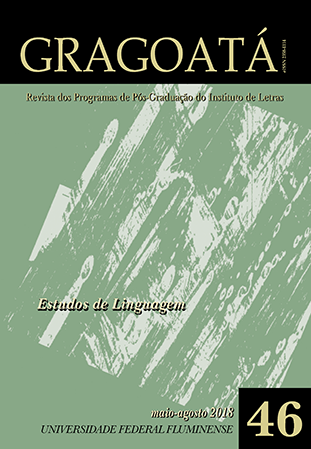Quando 'falar' vira ordem: a construção FALAR PARA V. infinitivo em Português, uma explicação cognitiva
DOI:
https://doi.org/10.22409/gragoata.v23i46.33590Palavras-chave:
Construção FALAR PARA V. infinitivo. Subjetificação. Linguística CognitivaResumo
Neste artigo, focalizamos a construção FALAR PARA V.infinitivo no Português do Brasil (PB), na oralidade e na escrita, em contextos em que emerge sentido manipulativo. O compartilhamento de domínios semântico-gramaticais entre os verbos pedir e falar, tais como a conceptualização de “atividade comunicativa com o uso da palavra” e a possibilidade de complementação com que V. finito e com para V.infinitivo, direcionou-nos para a investigação sobre as similaridades e diferenças que as construções com esses verbosapresentam.Com tal propósito, estabelecemos contraste com o Português Europeu (PE),na mesma sincronia, considerando o pressuposto cognitivista de que diversificações semânticas são resultantes de diferenças de conceptualização. Buscamos, assim, identificar as operações cognitivas envolvidas nos processos de conceptualização que permeiam as escolhas dos falantes, tanto no sentido para a estabilidade quanto para a mudança semântica. As concepções de perspectivação e de subjetificação, tomadas dos estudos desenvolvidos por Traugott (1989), Traugott e Dasher (2002) e Langacker (2008), nortearam a análise dos dados, que aponta a construção FALAR PARA V.infinitivo como um exemplo de processo de mudança semântica no Português do Brasil (PB), na oralidade e na escrita.
---
Downloads
Downloads
Publicado
Edição
Seção
Licença
AUTORIZAÇÃO
Autores que publicam em Gragoatá concordam com os seguintes termos:
Os autores mantêm os direitos e cedem à revista o direito à primeira publicação, simultaneamente submetido a uma licença Creative Commons Atribuição 4.0 Internacional (CC BY 4.0), que permite o compartilhamento por terceiros com a devida menção ao autor e à primeira publicação pela Gragoatá.
Os autores podem entrar em acordos contratuais adicionais e separados para a distribuição não exclusiva da versão publicada da obra (por exemplo, postá-la em um repositório institucional ou publicá-la em um livro), com o reconhecimento de sua publicação inicial na Gragoatá.
A Gragoatá utiliza uma Licença Creative Commons - Atribuição CC BY 4.0 Internacional.











